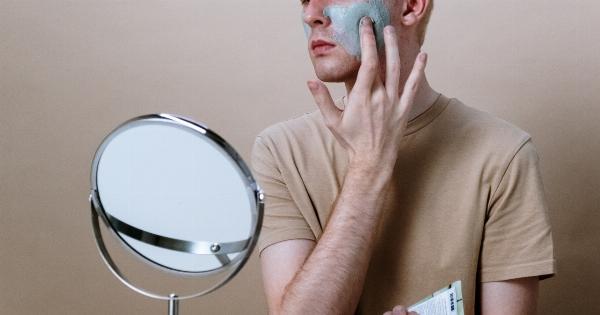Acne is often seen as a teenage problem, but the reality is that it can affect people of all ages. Adult acne is a frustrating and often embarrassing condition that can significantly impact one’s self-esteem and confidence.
In this article, we will explore the common causes of adult acne and provide effective remedies to help you deal with this troublesome condition.
1. Hormonal Imbalances
Hormonal imbalances are one of the leading causes of adult acne. Fluctuations in hormone levels can stimulate the oil glands in the skin, leading to an overproduction of sebum.
This excess oil clogs the pores and provides a breeding ground for acne-causing bacteria.
To address hormonal imbalances, consider consulting with a dermatologist or medical professional who can recommend appropriate hormonal therapies or birth control options to regulate your hormones.
Additionally, certain lifestyle changes, such as managing stress levels and getting enough sleep, can help in balancing hormone levels naturally.
2. Stress
Stress has long been known to impact our physical and mental well-being, and it can also contribute to adult acne. When we experience stress, our bodies release cortisol, a hormone that stimulates the production of oil in our skin.
This can lead to clogged pores and the development of acne.
To alleviate stress-related acne, implementing stress management techniques such as meditation, yoga, or exercise can be beneficial.
Taking time for self-care and engaging in activities you enjoy can also help reduce stress levels and promote healthier skin.
3. Poor Skincare Habits
Inadequate skincare habits can exacerbate adult acne. Using harsh or abrasive cleansers, scrubbing the skin vigorously, and not following a consistent skincare routine can all contribute to acne breakouts.
Additionally, using heavy or pore-clogging makeup products can further worsen the condition.
It is crucial to adopt a gentle skincare routine that includes cleansing twice a day with a mild cleanser specifically formulated for acne-prone skin. Avoid using abrasive scrubs and instead focus on gentle exfoliation a few times a week.
Opt for non-comedogenic and oil-free makeup products to minimize pore clogging.
4. Unhealthy Diet
Your diet plays a significant role in your overall skin health. Consuming a diet high in processed foods, sugary snacks, and refined carbohydrates can contribute to adult acne.
These types of foods can spike blood sugar levels, leading to increased hormone production and inflammation in the body.
Opt for a balanced diet rich in fruits, vegetables, whole grains, and lean proteins. Avoid sugary and processed foods as much as possible.
Incorporating foods with anti-inflammatory properties, such as green leafy vegetables, berries, and fatty fish, can help reduce acne-causing inflammation.
5. Medications
Certain medications, including some antidepressants, corticosteroids, and anticonvulsants, can trigger or worsen adult acne. These medications can interfere with hormone levels, leading to increased oil production, clogged pores, and acne flare-ups.
If you suspect that a medication you are taking is contributing to your acne, consult with your healthcare provider. They may be able to prescribe an alternative medication or adjust your dosage to minimize the impact on your skin.
6. Undiagnosed Medical Conditions
Adult acne can sometimes be a symptom of an underlying medical condition. Conditions such as polycystic ovary syndrome (PCOS), hormonal disorders, or even certain types of cancers can manifest as acne breakouts in adults.
If you are experiencing persistent and severe acne, it is crucial to consult with a dermatologist or medical professional.
They can evaluate your symptoms, conduct any necessary tests, and determine if an underlying medical condition may be causing your acne.
7. Regular Exercise
Regular exercise is beneficial for overall health, and it can also contribute to clearer skin. When we exercise, our bodies release endorphins and increase blood circulation, which can help reduce stress and promote a healthy complexion.
However, it is important to maintain good hygiene practices when it comes to exercise. Always cleanse your face before and after a workout to remove sweat, oil, and bacteria that can clog pores.
Avoid wearing tight-fitting exercise gear that may rub against the skin and cause friction-induced breakouts.
8. Natural Remedies
There are several natural remedies that can complement your skincare routine and help alleviate adult acne. These remedies include:.
- Tea Tree Oil: Known for its antimicrobial properties, tea tree oil can effectively combat acne-causing bacteria. Apply a diluted solution to affected areas using a cotton swab.
- Aloe Vera: Aloe vera has soothing and anti-inflammatory properties that can help reduce redness and irritation associated with acne. Apply pure aloe vera gel to affected areas as a spot treatment.
- Green Tea: Green tea contains antioxidants that help fight inflammation and can aid in reducing acne. Brew green tea and apply the cooled tea as a toner or use green tea extract in your skincare routine.
- Apple Cider Vinegar: Apple cider vinegar acts as a natural astringent and can help balance the pH of your skin. Dilute apple cider vinegar with water and apply it as a toner or spot treatment.
- Honey and Cinnamon Mask: Mixing honey and cinnamon creates a natural antibacterial mask that can help calm acne. Apply the mixture to your face and leave it on for 10-15 minutes before rinsing.
9. Over-the-Counter Treatments
If your adult acne persists or is severe, over-the-counter (OTC) treatments can be effective in managing and reducing acne breakouts.
Look for products that contain ingredients such as benzoyl peroxide, salicylic acid, or sulfur, as they can target bacteria and exfoliate dead skin cells.
Read and follow the instructions on the product labels carefully. Start with a lower concentration to minimize potential skin irritation and gradually increase if necessary.
It is also essential to moisturize your skin adequately to prevent dryness and flakiness that can exacerbate acne.
10. Consult a Dermatologist
If your adult acne persists despite trying various remedies and treatments, it is advisable to consult a dermatologist.
A dermatologist can assess your skin condition, recommend prescription medications, perform procedures like chemical peels or laser therapy, and guide you in establishing an effective long-term skincare routine.





























